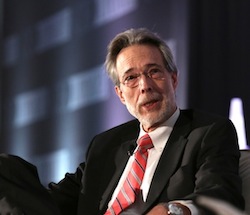Wisdom from the Association Leadership Award winners
Wisdom from the Association Leadership Award winners
- October 17, 2014 |
-
 LORI SHARN BRYANT
LORI SHARN BRYANT

Technology is changing the game, but personal relationships—with members, staff and lobbying contacts—are fundamental
RELATED CONTENT
|
BBC anchor Katty Kay interviewed Bruce Josten, John Graham and Tom Donohue one on one about dealing with technological and global change, what they would tell Millennials about associations, and about the future. A common theme: Everything comes down to people.
‘Guard your personal integrity'
 Josten |
Josten, executive vice president for government affairs at the U.S. Chamber of Commerce, spoke about integrity as a lobbyist, a profession often maligned in the media and by the Obama administration. Josten said he is always direct with people, and follows through when he says he will—or won't—do something.
"This is a job that requires trust. I tell everybody that I hire—that's a young person who comes into our operation, for example—to remember you go home at night with one thing, and only one thing intact, and that's your personal integrity," Josten said. "No matter what you do in this town, you guard your personal integrity."
Josten said individuals must invest in themselves and learn new ways of doing things, but advocacy will remain at its core a "one-on-one people business."
His biggest personal setback: failing to achieve an overhaul of federal entitlement programs. Biggest achievement: chairing a coalition that led to the first balanced budget in decades.
‘I don't own the association'
 Graham |
Graham noted a common thread through his career: The association "isn't mine. … It's mine to be a good steward, it's mine to demonstrate inspiration and passion. … My goal is to give it back in a much better condition than I received it."
Graham, CEO of ASAE, said the old membership model—of everyone paying the same dues—is changing. Associations must be more nimble to engage with members who only want to pay for what they want, when they want it. Mobile technology, he said, will have the same impact as the advent of the personal computer 30 years ago.
"Mobile technology allows people to create their own experience with an association," Graham said. "It's all additive to the experience. … At the end of the day, we are still creating an experience or trying to create an experience, but we have to do it not only in the physical, but in the virtual and the digital."
What won't change: "People still want human interaction. People still want to touch. … And that's what associations really do best. That's who we are and what we do."
‘Hire the best people you can find'
 Donohue |
Donohue elicited laughter with some of his deadpan responses. When Kay mentioned the other awards the U.S. Chamber CEO must have on his shelf, he said, "I'm beginning to worry it may be a collection that leads to an obituary."
Kay noted his 30 years running two associations, and told Donohue, "You could have years ago said, "I declare victory. I'm done.'" His retort: "And do what?"
Donohue said as a younger leader he stumbled many times, because he thought he was better than he was. Surround yourself with smarter people, he advised.
At the Chamber, "Nobody is allowed to hire anybody that's as dumb as they are," Donohue said. "The bottom line is … you can't be there all the time. And I don't care whether you're a large budget or a small budget—hire fewer people to spend more money to get the best people you can get, so when you're not there they'll do what you expect, or better than you expect, again and again."
Having a belief system is fundamental, he said. If you've got that, the right people and a way to get where you want to go, then you need cash: "If you don't have the cash, you don't make the dash."
As for the future of associations, Donohue said that's impossible to predict without knowing what will happen in the world. "We have to be reactive to the people we represent," he said.
